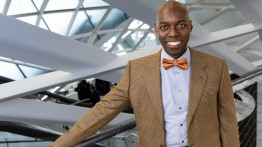Three Questions for Demetrius L. Eudell
POSTED ON: July 6, 2023

Photo by Leo Sorel
This week, Demetrius L. Eudell joins The Cooper Union in the newly established position of vice president of academic affairs. Eudell, who previously was dean of social sciences at Wesleyan University, brings to Cooper extensive, scholarly experience with a focus on 19th-century US history, intellectual history, and the history of Black people in the Americas. In his new academic leadership role, he will help foster academic collaboration across Cooper’s programs. We asked him a few questions as he prepares to join our community.
What drew you to The Cooper Union?
I was drawn to Cooper by its unique history, innovative curricular offerings, and distinctive place in higher education, founded to provide free education to men and women. Peter Cooper believed education should be free to all students, and contemporary Cooper is returning to this original mission. A year after its founding, Abraham Lincoln launched his political career with his famous 1860 Cooper Union speech, which directly led to his presidency. I am delighted to join Cooper, where this tradition of engaged public discussion on urgent social issues is combined with a rigorous education in the applied arts and sciences as well as the humanities and social sciences.
What excites you about moving to New York City?
Despite numerous challenges, New York nonetheless remains a center of culture and the arts, with a mixture of peoples from everywhere in the world that is difficult to match. These cultural institutions are combined with institutions of higher learning and civic engagement that provide fertile ground for intellectual stimulation and collaboration. It also must be acknowledged that the restaurants and food landscape continue to be a mecca, which is itself a direct effect of its cultural diversity.
What role should humanities and social sciences education play at Cooper?
The humanities and social sciences are essential components for rounding out education in the pre-professional fields at Cooper. While each of the three degree-granting schools provide training that will allow graduates to go into the world to practice in the field, upon entering the work world, they will certainly be confronted directly with questions that extend beyond the specificities of their formal training. For instance, concerns have emerged in technological innovation with pollutants produced from chemical processes and the ethics of code, robotics, and AI. As well, in architecture, where and for whom structures are created, as well as the materials used to construct buildings, are crucial humanistic questions. Additionally, the issues of representation and recognition in the visual arts (applied and putative “fine” arts worlds), despite the increased presence of marginalized groups, remain a challenge. It is with an approach to the humanities also as practical knowledge that Cooper offers its students a holistic education enabling them to undertake these challenges.




